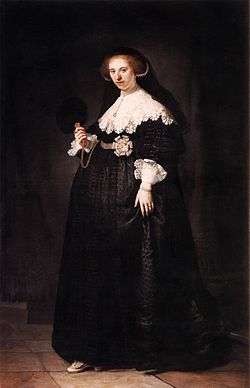Portrait of Marten Soolmans
 Portrait of Marten Soolmans | |
| Artist | Rembrandt |
|---|---|
| Year | 1634 |
| Catalogue | Rembrandt Research Project, A Corpus of Rembrandt Paintings VI: #120a |
| Medium | Oil on canvas |
| Dimensions | 209.5 cm × 135.5 cm (82.5 in × 53.3 in) |
| Location | Rijksmuseum and Louvre, Amsterdam and Paris |
Portrait of Marten Soolmans (1613-1641) is a painting by the Dutch Golden Age painter Rembrandt, painted on the occasion of his marriage to Oopjen Coppit in 1634 and in 2015 purchased from the Rothschilds as part of a joint collaboration between the Rijksmuseum and the Louvre. It is considered a pendant portrait, and the portrait of his wife was included in the sale. Together the paintings were sold for 160 million Euro.[1]
Painting
This painting was documented by Hofstede de Groot in 1915, who wrote: "637 MAERTEN DAEY (1604-after 1650). Sm. 340. ; Bode 303 ; Dut. 208 ; Wb. 316 ; B.-HdG. 107. Full length ; life size. About thirty. He is seen almost in full face. He walks a little to the right on the parti-coloured stone floor, at the back of which is a step. He wears a very rich black costume, consisting of a coat with large stripes, breeches, and a short cloak of the same material, a broad and close-fitting lace collar, smooth cuffs, rosettes of lace at his waistband and on his shoes, and white stockings, with bows of rich lace on his garters. A broad-brimmed black slouch hat covers his thick fair hair ; he has a plump and beardless face. His right hand rests on his hip under the cloak ; his out-stretched left hand holds a glove. In the right background is a bluish-green curtain. [Pendant to 638.]
Signed on the left at foot, "Rembrandt f. 1634" ; canvas, 82 inches by 52 inches. Etched by L. Flameng in the Gazette des Beaux-Arts, 1879; in the Nederlandsche Kunstbode, 1879, p. 2 ; and in Dutuit. Mentioned by Vosmaer, pp. 145, 502 ; Bode, p. 402 ; Dutuit, p. 52 ; Michel, p. 148 [112-14, 436]; Moes, 1881. Exhibited at Amsterdam 1867, No. 161.
Sale. Hendrik Daey, Alkmaar, 1798 (4000 florins, with pendant, R. M. Pruyssenaar and Adriaen Daey, who sold the pair to Van Winter for 12,000 florins). In the Van Winter collection, Amsterdam, which passed by inheritance to the Van Loons. In the Van Loon collection, Amsterdam ; sold as a whole in 1877 to the Rothschilds. In the collection of Baron Gustave de Rothschild, Paris. In the collection of Baron Robert de Rothschild, Paris."[2]
The painting was known as the "Portrait of Meneer Day". He and his wife, who married 9 June 1633, were only properly identified in the 20th-century.[3][4] The confusion of the names came about because after Marten died, Oopjen remarried Captain Maerten Pietersz. Daij, and she outlived this second husband as well. After her death the paintings remained in the Daij or Daey family and members of that family assumed the portraits were of Daij and his first wife.[5]
Pendants
The joint purchase of these paintings was made by the Rijksmuseum and the Louvre on February 1, 2016. For the first time since 60 years, they were exhibited at the Louvre on March 10, 2016 until June 13, then for another 3 months at the Rijksmuseum, before their restoration. The intergovernmental agreement will keep these pendants together,[6] alternately at the Louvre again, then at the Rijksmuseum for five years, followed by periods of eight years. They consequently may not be lent to other institutions.[7]
 Marten Soolmans
Marten Soolmans Oopjen Coppit
Oopjen Coppit
See also
References
- ↑ Press release covered in the NRC Handelsblad
- ↑ Entry 637 for ''Maertin Daey in Hofstede de Groot, 1915
- ↑ The pendant portraits are listed as 164 Maerten Soolmans and 165 Oopjen Coppit in Horst Gerson's Rembrandt catalog of 1968
- ↑ Portrait of Marten Soolmans (1613-1641), 1634 gedateerd in the RKD
- ↑ family relations of Oopjen Coppit and Maerten Soolmans explained in the Montias database
- ↑ Press release September 2015
- ↑ Portraits of Maerten Soolmans and Oopjen Coppit by Rembrandt, an exceptionnal acquisition exhibited at the Musée du Louvre, www.louvre.fr
- Press release covered in The Guardian